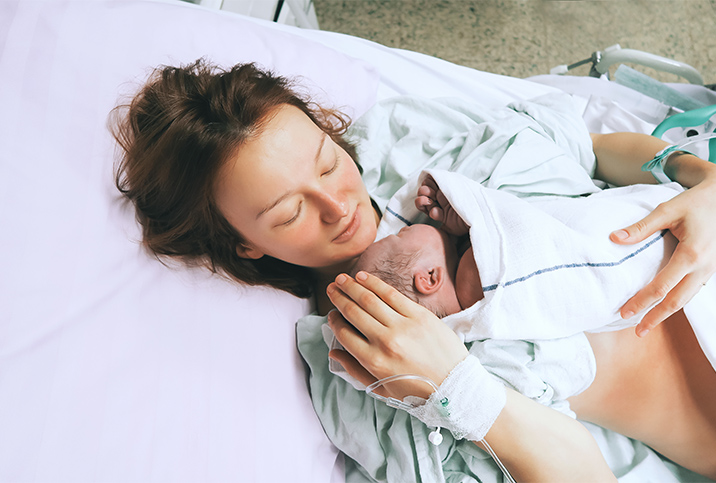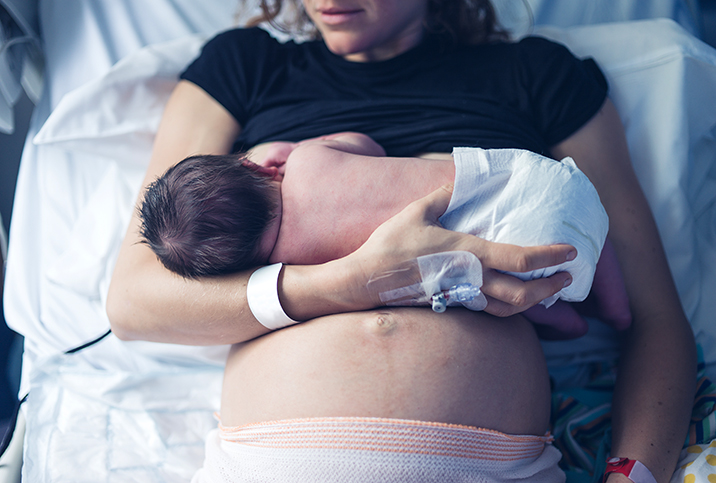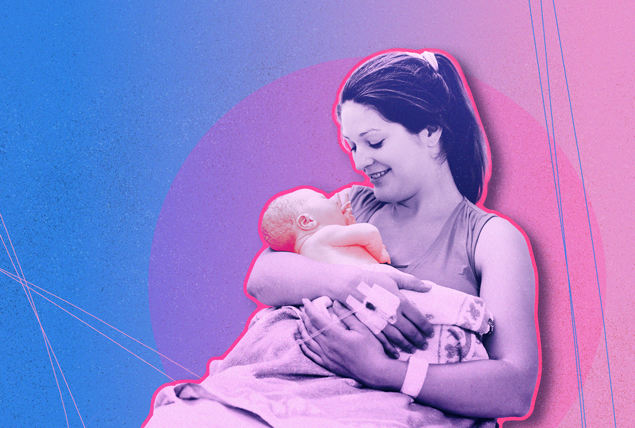Is It Active Labor or Prodromal Labor?

Are you pregnant and experiencing contractions? It feels like labor is beginning but that's not always the case. It could be you're experiencing prodromal labor, or false labor. Your doctors will confirm your contractions are real enough, but they may come and go without you progressing to real labor.
Are there any strategies you can use to transform prodromal labor into real labor? Is there anything you can do to help speed things along?
Let's take a look at what you can do to help your labor and delivery progress.
What is prodromal labor?
In Greek, the word prodromos means "running before." Prodromal labor causes labor contractions before active labor, the stage that's the precursor to birthing. Prodromal labor, sometimes called false labor, occurs in the third trimester, typically after 37 weeks. It is a common condition that reportedly affects as many as 30 percent of pregnancies.
Prodromal labor is sometimes referred to as early, false or latent labor, explained P. Fadwah Halaby, A.R.N.P., a certified nurse midwife and the founder of Midwife360.
The difference between false labor and real labor is that the contractions during real labor become stronger and more frequent whereas prodromal contractions remain at the same intensity and the timing stays the same.
'Women with a history of three or more pregnancies may also be at a higher risk for prodromal labor.'
For a woman nearing her due date, prodromal labor can prove frustrating and cause a drive to the hospital only to realize real labor has not yet begun.
Like any type of false labor, prodromal labor can signify that your body is preparing for real labor. It's a sign that you've passed 37 weeks but you now have a window of five more weeks when prodromal labor can happen.
Just know that you haven't done anything wrong. Prodromal labor can happen to anyone who's pregnant, young and old, whether you're a new mother or you're on your way to number eight.
What are the symptoms of prodromal labor?
You may think you're experiencing the pains of labor, and then your contractions stop. Why? How do you know you have prodromal labor contractions?
"Prodromal labor is symptoms of labor or contractions that result in minimal dilation and effacement of your cervix," said Liesel Teen, B.S.N, R.N., a labor and delivery nurse and the founder of Mommy Labor Nurse. "These contractions are called nonproductive contractions."
Prodromal labor is similar to how active labor feels, with painful and regular contractions, she added. But it starts and stops. These contractions can last for as long as a minute, but they don't increase in intensity.
Prodromal labor is typically painful but does not progress or cause the cervix to dilate.
"The signs of prodromal labor are having the sensation of tightening or hardening of the uterus accompanied by cramping," Halaby said.
You may feel contraction pains in your lower abdomen or back. They can last upwards of five minutes, but they won't get closer together. How long prodromal labor lasts is highly variable based on the individual.
"These uterine contractions will come and go—either regularly or irregularly," she added. "It can go on for hours or even days."
Does prodromal labor dilate you?
Prodromal labor can share signs of active labor, but they are not the same. It can be difficult to tell the difference, especially for first-time mothers, according to Teen.
In active labor, your cervix dilates from 6 to 10 centimeters and contractions become regular. Prodromal labor is different.
"Most women who experience prodromal labor think they are in real labor because their contractions are painful and regular. It's only when they have their cervix checked and are told that they are not dilated, or that their dilation has minimally changed since their last examination, that we realize they are experiencing prodromal labor," Teen said. "If you're trying to differentiate between the two, it's important to track the frequency of your contractions."
How do you know if you are experiencing active labor and not prodromal labor? Teen provided three signs of active labor:
- The time between your contractions is growing shorter.
- Your contractions are becoming more regular.
- Your contractions are progressively intensifying.
"It's not uncommon to experience prodromal labor for several days before true, active labor kicks in," Teen said.
While prodromal and active labor are not the same, prodromal labor can advance to active labor.
What's the difference between Braxton Hicks and prodromal labor?
Unlike prodromal labor contractions, Braxton Hicks contractions are unpredictable and irregular. With both of these false labor contractions, however, they never get closer together.
Prodromal labor contractions don't typically stop if you move around or change your position. Braxton Hicks contractions may cease if you begin moving around. You will not experience other signs of labor with either of these contractions, such as seeing the mucus plug or feeling your water break.
About 10 percent of women will experience preterm labor contractions.
What causes prodromal labor?
The exact cause of prodromal labor can be difficult to pinpoint. However, certain factors can contribute to its occurrence. Prodromal labor may serve as the body's effort to reposition for labor.
"Your body starts preparing itself weeks in advance of labor—whether you notice those changes or not," said Christie Hardy, a resident midwife with United Kingdom-based Positive Birth Company.
If your contractions are consistent and regular, definitely give your healthcare provider a call or even just head to your place of delivery.
Some possible causes of prodromal labor, according to Cleveland Clinic, may include the following:
- Baby positioning for labor and delivery
- High stress and anxiety
- Irregular pelvis, uterine anomaly or other physical factors
- More than three previous pregnancies
As noted above, psychological factors or prior pregnancies can influence prodromal labor.
"Some possible causes of prodromal labor include anxiety or stress and malposition of the baby within your uterus," Teen said. "Women with a history of three or more pregnancies may also be at a higher risk for prodromal labor."
What should you do if you experience prodromal labor?
Are you in active labor or prodromal labor? Are you in a phase of labor at all? It can be difficult to tell. If you're concerned, reach out to your doctor for advice and peace of mind.
The contractions during prodromal labor can be painful and last for hours, days or longer. For these factors, prodromal labor can be a frustrating experience, though it should be noted that prodromal labor is not harmful to a mother or a baby.
"Rest as much as you possibly can, take a warm shower or use a heating pad on your back, take a light walk to try and distract yourself from it," Teen said. "Do something calming or relaxing like reading a book, watching a movie, listening to music or meditating."
The important lesson is to use this time to mentally prepare for labor.
How can you turn prodromal labor into real labor?
Prodromal labor may help your body prepare for delivery, but it does not cause labor to begin, according to doctors and other healthcare professionals.
And, no, don't believe everything you read: Hot sauce won't induce labor.
How do you know when you are in active labor?
While prodromal labor may not lead to active labor, certain signs may indicate it's time to call your provider.
"If you're timing your contractions and they're consistent and regular, then definitely give your healthcare provider a call or even just head to your place of delivery," Teen said.
The onset of new symptoms also warrants a call. Never hesitate to call your doctor if you feel like something isn't quite right or if you have questions.
"If your contractions are paired with significant discharge, leaking or bleeding, notify your healthcare provider promptly," Teen said. "If you experience any persistent pain that falls outside the range of what you'd normally expect at your current stage of pregnancy—such as round ligament pain, muscle fatigue or lower back pain—there's no harm in checking in with a medical professional."
The bottom line
Prodromal labor can be an uncertain and frustrating time. But it may have a purpose.
"Your body is doing what it needs to in order to prepare for your baby's arrival," Hardy said.


















